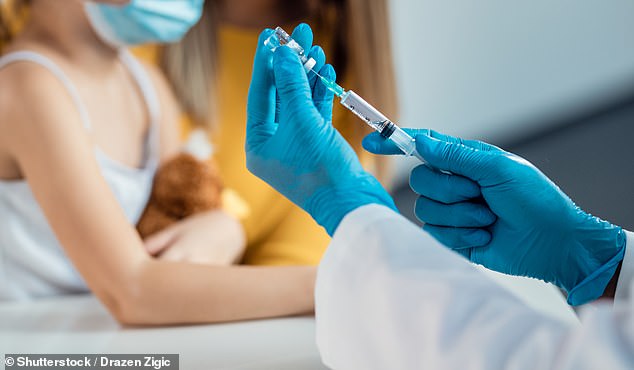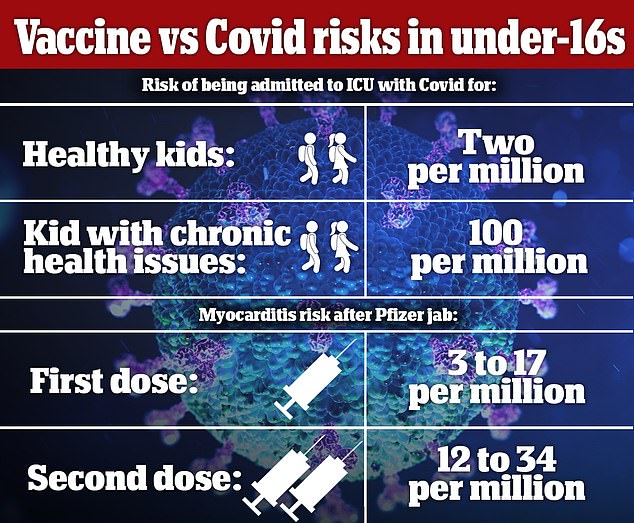Covid vaccines are being injected into healthy 12 to 15-year-olds in schools across Britain today for the first time.
A single dose of Pfizer’s jab is being used in the hope that the roll-out will prevent further disruptions to their education.
Parental consent is being sought but children can overrule parents who do not want them to get the jab if deemed ‘competent’, in a move that has caused controversy.
More than 3million under-16s are eligible for the vaccines and ministers expect at least 60 per cent to take up the offer.
The jabs are being administered at some schools in England today and the rollout is due to begin in Scotland and Wales later this week. In Northern Ireland, the head of the region’s vaccination programme said jabs are likely to be offered in schools from October.
The scientific community has been split over vaccinating healthy children against Covid because the virus poses such a low risk to them.
No10’s own advisory panel said earlier this month that immunising them would only provide ‘marginal’ benefit to their health, and not enough to advise a mass rollout.
But Professor Chris Whitty and the chief medical officers in the devolved nations came down in favour of expanding the inoculation drive after weighing up the wider benefits to children.
They said hundreds of thousands of school absences could be prevented and school closures averted if there was good uptake of the vaccines.

Covid vaccines are being injected into healthy 12 to 15-year-olds in schools across Britain today for the first time (file)

Earlier this month the JCVI said it could not recommend Covid jabs for healthy 12 to 15-year-olds because the direct benefit to their health was only marginal. It also looked at the risk of health inflammation – known as myocarditis – in young people given the Pfizer vaccine, which was still very small but slightly more common after a second dose
The roll-out in England will primarily be done in schools through the in-school vaccination service teams that already carry out routine vaccine programmes for illnesses like flu.
Schools will be used as a site for administering the vaccines and distributing consent and information forms to pupils and guardians.
Teachers have been told not to hesitate in phoning police to deal with anti-Covid vaccine campaigners amid fears of protests at school gates over the rollout.
Adviser admits jabs would not have been recommended for use on children in normal times
A government advisor over the weekend admitted the Covid vaccine would not have been recommended for children in normal times until it had been fully investigated.
Professor Adam Finn, a member of the Joint Committee on Vaccination and Immunisation (JCVI), said scientists did not have the ‘luxury’ of time to research the possible risks of jabbing children and would usually have collected more evidence before recommending their use on teens.
It comes after the school rollout of jabs for children aged 12 to 15 was given the go ahead last week, with the vaccinations set to start on Wednesday.
But Finn said parents were justified in waiting an extra three to six months to get their children jabbed until the risks were made clearer with further research, the Times reported.
Finn added the decision on whether to vaccinate 12 to 15-year-olds is not black and white, adding that while it is not ‘essential’ for them to have a coronavirus jab, it is also ‘perfectly sensible’ for them to do so.
Advertisement
Pfizer’s jab was approved for 12 to 15-year-olds last Monday, and within hours of the announcement pressure groups had already threatened action.
National guidance says if headteachers catch wind that a protest is being staged on school grounds they should ‘alert the local authority and police’.
Previous anti-lockdown and vaccine protests have seen streets shut in London’s city centre and projectiles launched at the Houses of Parliament.
Children in Scotland can go to drop-in clinics or wait for a letter offering them a scheduled appointment.
Jabs for children in Wales will be carried out at mass vaccination centres and some school settings.
An expert advising on jabs urged parents to be tolerant of one another when it comes to deciding whether to have their children vaccinated against coronavirus.
Professor Adam Finn, a paediatrician and member of the Joint Committee on Vaccination and Immunisation (JCVI), said the decision on whether to jab 12 to 15-year-olds is not black and white.
He added that while it is not ‘essential’ for them to have a coronavirus vaccine, it is also ‘perfectly sensible’ for them to do so.
The JCVI decided not to recommend mass vaccination of 12 to 15-year-olds on health grounds alone, but the expert panel suggested that wider issues, such as disruption to education, should be taken into consideration and examined by the UK’s four chief medical officers.
Those health chiefs subsequently said a single dose of Pfizer for people in this age group will significantly reduce the chance of a young person getting Covid and passing the virus on.
Professor Finn, speaking at the weekend on BBC Breakfast, said the reason the process for deciding whether to vaccinate children of this age has been ‘convoluted and complex’ is because there ‘isn’t a completely clear, straightforward answer’.
But he added that people should not become too ‘agonised’ about it because the risks on either side ‘are not that high’, explaining that children of this age are not at great risk from Covid, nor at great risk from the vaccine.
Parental consent will not be needed if a child is considered competent to make a decision by themselves, but England’s chief medical officer Professor Chris Whitty has said for the ‘great majority of cases, children and their parents come to the same decision’.
It comes as booster jab invites are being sent out to 1.5million people in England this week in what Health Secretary Sajid Javid said was an effort to ‘strengthen the wall of defence’ against coronavirus created by the vaccines.
Revealed: The logistics of vaccinating over-12s in schools
How will it work?
The NHS has already been asked to prepare to offer Covid vaccines to 3million 12 to 15-year-olds.
Doses will mostly be administered through the school vaccination programme, which manages HPV and flu inoculations in schools every year.
Official figures showed almost 90 per cent of children offered the HPV vaccine every year take it.
Children will likely receive their vaccines in suitable areas such as school halls. They will be delivered by nurses, healthcare support workers and administrative staff.
Parents are set to receive a letter revealing the plans for jabbing kids in the coming days, No10’s vaccine minister Nadhim Zahawi revealed today. They will also be asked to consent to their child receiving the vaccine.
Will it need parental consent?
Under-16s are not automatically presumed to be legally competent to make decisions about their healthcare and, therefore, whether they should get the Covid jab.
But the courts have previously ruled that under-16s are competent to give consent to an intervention if they have ‘sufficient understanding and intelligence to understand fully what is proposed’.
This is known as the ‘Gillick test’, and has been in place since the 1980s.
The test is normally carried out by a medical professional or nurse, who assesses the child’s maturity, and their understanding of the advantages, disadvantages and potential long-term impacts of vaccination. They then give a view on whether the child is competent to consent to vaccination.
Can children overrule their parents?
Mr Zahawi said today that children as young as 12 could be able to overrule their parents to get the vaccine.
But he admitted this was likely to be a ‘very rare occurrence’ for the youngest children. He also said parents should not be ‘stigmatised’ if they are hesitant about their children being vaccinated.
Mr Zahawi said children would only be able to choose to have the coronavirus vaccine against their parents’ wishes following a meeting with a clinician.
The deputy head of the JCVI Professor Anthony Harnden said there was ‘sliding scale’ of competency, meaning it would be easier for a 15-year-old to overrule their parents than a 12-year-old who is ‘less likely to be deemed competent’.
Professor Chris Whitty said, in terms of medical consent: ‘In the majority of cases, children and their parents come to the same decision.’
Advertisement
Source link : https://www.dailymail.co.uk/news/article-10008565/12-15-year-olds-given-Covid-vaccines-schools-TODAY.html











